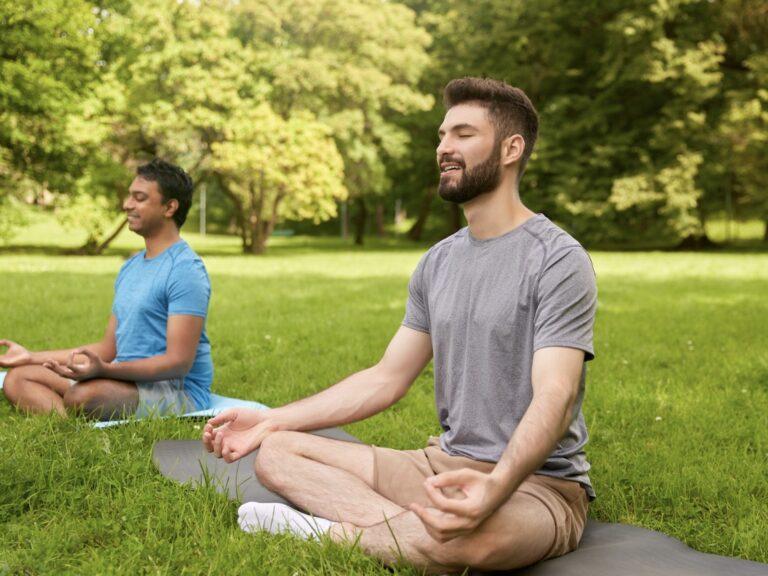
Running is a great way to exercise. It doesn’t cost a lot to do and you can run at any time that suits you. You can take part in fun runs, races or marathons. It’s also a great way to meet new people. Join a running club, they have sessions designed for beginners through to more advanced marathon runners. Whatever works best for you.
Running isn’t just good for your physical health. It has a whole range of health benefits. Here, we’ll take a look at all of the health benefits of running.
What are the health benefits of running?
Running or jogging, is one of the best cardio exercises you can do. Regular running for at least 10 minutes a day can make you fitter and lower your risk of cardiovascular disease, heart attack, stroke, high blood pressure and other serious complications. Any amount of running, even once a week, is better than no running.
Runners have a better body composition (less fat), lower cholesterol, excellent glucose and insulin control, stronger bones, better hormone regulation and positive neurological functioning. Runners lower their chances of dying from heart disease by half. It’s great for your heart health.
Will running help me lose weight?
Running is a great cardio exercise and burns more calories than most other activities. You don’t have to run fast to achieve max burn. You get almost as much from running slow.
According to the British Journal of Sports Medicine, the authors state “It is incontrovertible that exercise can and does result in weight loss.” Moreover, it leads to a “multitude of other positive effects on health.” If you want to keep track, running burns roughly 100 calories per mile. (For more accuracy, multiply 0.75 x your body weight in pounds to get your personal calorie burn per mile.)
In a 2018 paper titled “The Effects of Exercise and Physical Activity on Weight Loss and Maintenance,” the authors found that people exercising 200 to 300 minutes per week achieve better weight management than those doing less than 150 minutes a week.
Is running bad for my knees?
Running is a high impact sport, which must be bad on the joints, right? Everyone knows a runner who’s developed knee pain and had to switch to cycling or swimming. But it’s also true that sedentary, out-of-shape non-runners have worse knee and back problems, on average than most runners. Running actually helps to improve and maintain the density or strength of your bones, reducing your risk of developing osteoporosis. We do however recommend investing in a pair of decent running shoes. Something with a cushioned heel is best.
Will running improve my immune system?
Modest exercise improves immunity. According to studies, running can improve the body’s surveillance against disease, lower inflammation, enhance gut microbiota composition, reduce the risk of upper respiratory infections and influenza and improve antibody response. Regular exercise is good, but extreme exercise can temporarily lower your immunity.
Does running improve mental health and reduce depression?
Running isn’t just good for your cardiovascular health, it has mental health benefits too. Aerobic exercise triggers a release of endorphins, chemicals that help relieve pain or stress. Running helps boost your mood, concentration and overall quality of life. Runner’s high is real.
Exercise is an effective treatment for depression, is as effective as psychotherapy and prescription meds and may act as an alternative to costly medical treatments. It does not mean you should rely completely on running and exercise when dealing with depression. Depression should be managed with a full array of medical approaches.
Can running reduce the risk of cancer?
Running will considerably lower your risk of cancers like colon cancer, prostate cancer, lung cancer, or breast cancer.
High-fitness exercisers, such as runners, have a lower risk for developing 26 different kinds of cancer than low and non-exercisers. The benefits could not be traced to either non-smoking or low-body-weight–to known cancer-protectors.
In addition, running is also helpful if you do develop cancer. Regular exercise also lowers side effects from treatments while supporting you physically and emotionally. It also reduces the likelihood of death from cancer and reduces the chance that you develop another type of cancer.
Does running stop diabetes?
High blood glucose levels, often lead to diabetes, a major side effect of obesity.
Running and exercise can prevent or reduce Type 2 diabetes caused by poor lifestyles and will benefit those with Type 1 diabetes. It can also prevent those with pre-diabetes from developing Type 2 diabetes.
In a recent study, it was found that runners had a 72 per cent lower rate of diabetes development than non-runners. Researchers concluded that participating in leisure-time running is associated with a lower risk of developing type 2 diabetes in adults.
Does running prevent ageing?
Exercise has the beneficial effect of slowing down or even counteracting age-related decline in mental and physical capacity. Physical exercise such as running has an anti-ageing effect on the hippocampus region of your brain, an area that controls memory, learning and balance.
A new study comparing different forms of exercise, such as dancing and endurance training undertaken by elderly volunteers for eighteen months, shows that both can have an anti-ageing effect on the brain, but also that dancing showed a noticeable change in behaviour. This difference is attributed to the extra challenge of learning dancing routines.
Does running help with sleep?
There is evidence that exercise does help you fall asleep more quickly and improves sleep quality. The more you exercise, the more you need quality sleep. Also, the worse your sleep habits, the less likely you are to exercise regularly.
Except for a hard workout within an hour of your bedtime, other evening exercises actually improved the ease of falling asleep and the quality of your sleep.
Remember, as with everything, exercise in moderation, don’t overdo it, especially if you haven’t exercised for some time. It’s about changing your lifestyle long-term.
Sources
- Exercise – NHS guidelines and workouts to help improve your fitness
NowPatient has taken all reasonable steps to ensure that all material is factually accurate, complete, and current. However, the knowledge and experience of a qualified healthcare professional should always be sought after instead of using the information on this page. Before taking any drug, you should always speak to your doctor or another qualified healthcare provider.
The information provided here about medications is subject to change and is not meant to include all uses, precautions, warnings, directions, drug interactions, allergic reactions, or negative effects. The absence of warnings or other information for a particular medication does not imply that the medication or medication combination is appropriate for all patients or for all possible purposes.








